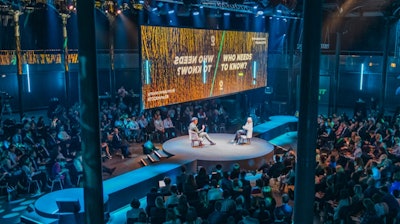
As the meeting and event industry continues to shift into its next reimagined era that encompasses a medley of live, virtual and hybrid gatherings, we’ve seen many event pros band together to help lead the charge through newfound organizations, coalitions, initiatives and beyond. One of the many to form over the last year is Experiential Marketing Measurement Coalition (EMMC), a nonprofit focused on improving the methods in which the success of events and meetings are measured.
Here, BizBash sat down with Dax Callner, EMMC chairman and strategy director at London-based creative experience agency Smyle, to discuss the coalition’s mission, new challenges event organizers will face in a virtual world and what the future of event measurement looks like.
What role has event measurement previously played in live gatherings?
Event marketers (and all marketers, if we are honest) are often stymied by the big measurement question. If you want to put a marketer on edge, ask them how they are measuring the impact of their live event.
It’s not that events are difficult to measure but rather that events tend to be the most expensive per-person-impacted marketing channel and therefore the most heavily scrutinized. Events are often first on the chopping block when marketing budget cuts are imminent—and in truth, most event marketers aren’t the best at defending their budgets with evidence of value.
Why is the way of the past no longer efficient for the industry’s future?
One key challenge is the desire by some stakeholders to directly correlate a financial return to an event investment—which is both impossible and unfair. It’s impossible because there are all kinds of factors that contribute to new revenue; the event is one customer touch point amongst many. The attribution of (eventual) sales to a single event is impossible, as it is for any single marketing touch, even with direct click-throughs to purchase in digital. Asking about event ROI is also terribly unfair as events impact audiences at all stages of the buying journey, and can even impact long-term purchase behavior. So, let’s step away from attempting a direct connection from event investment to revenue.
How is event measurement expected to change moving forward?
As we look to the future of event measurement, we must consider the virtual event zeitgeist of 2020/21. Virtual events and digital experiences produce reams of data about participant behaviors, not to mention more traditional measurement techniques like polls and surveys. Event marketers who’ve been involved in virtual events have had to step up their data game to at least understand what data is important to pay attention to and what should be discarded.
The other measurement challenge with the emergence of virtual events has been: What does “good” look like? As so many virtual events are new initiatives, there is little past data to compare results against, making it very difficult to understand if an event is indeed “successful.”
Tell us about EMMC and its mission to help the meeting and event industry.
The Experiential Marketing Measurement Coalition (EMMC) is made up of people and organizations with a shared purpose: improve measurement practices in our industry to improve our industry. The EMMC believes that better measurement will result in better events and will help event marketers protect and grow their budgets.
How is EMMC setting out to put its mission into action?
The EMMC is focusing its efforts on two key areas of measurement, with standards and practices to help event people evaluate changes in participant mindset and anticipated changes in behavior. Changes in mindset are tied to perception of the brand at hand, as stronger brand affinity has a proven correlation with business growth. Anticipated behavioral change is a way to measure business performance—a more honest approach (versus “ROI”) that looks at how people expect to act as a result of the event, with a connection to the behaviors that matter most. For example: anticipated purchase behavior. The EMMC is developing tools to help all event marketers consistently measure performance in these areas, in addition to whatever else they need to evaluate in their events.
The coalition is also developing global benchmarks so that event people can compare their results to others. This is a critical missing element from event measurement in both virtual and physical realms—global, comparative points to understand if your program is delivering. The ambition of the group is for a very deep “data lake” which event marketers can use to compare a range of consumer, B-to-B and employee event data points against, or even use to predict potential results before the event has happened.
There remains one key challenge, which is about the quality of data. When it comes to measurement, especially with common tools like surveys, bad behaviors abound. From poorly worded questions to way-too-long surveys, the result can be unreliable data. The EMMC has partnered with the UK Centre for Events Management at Leeds Beckett University to develop an accreditation model for conducting measurement. The concept is that marketers who are doing credible measurement will enjoy third-party validation, and those that are not can understand where they need to improve.
What’s the end goal for EMMC?
With these strategies in place, the future of event measurement is focused on the metrics that matter, is easy to understand and communicate, is based on credible data and is comparative so that we all know how we are doing versus others, so we can all hopefully improve our events, our business, our industry.



















